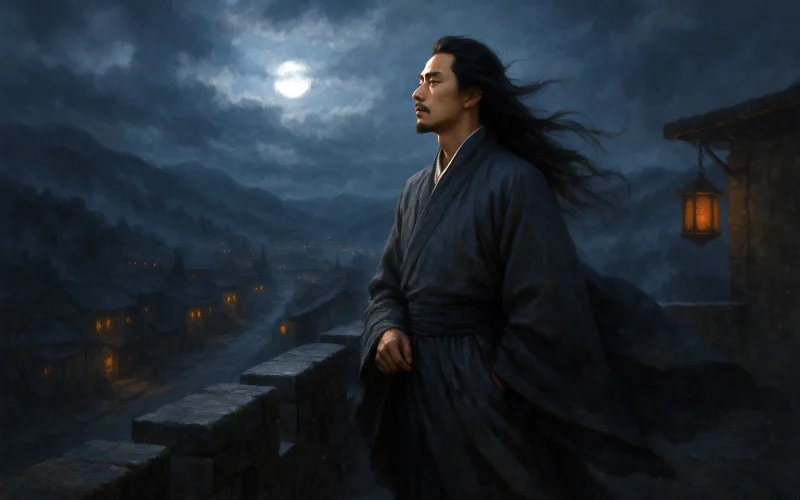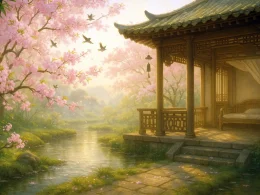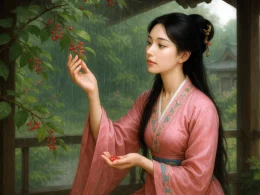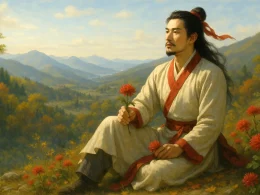The sun paints water ruby bright—
Fish dart through liquid shafts of light.
Along dark streams at dusk, crows hide,
While children gape and elders stare wide.
Deer freeze at men—still shy, untamed,
Monkeys need no drum’s call, self-claimed.
Back home, I’ll tell the mulberry maids
Of this day’s light and woodland shades.
Original Poem
「浣溪沙 · 照日深红暖见鱼」
苏轼
照日深红暖见鱼,连溪绿暗晚藏乌,黄童白叟聚睢盱。
麋鹿逢人虽未惯,猿猱闻鼓不须呼,归来说与采桑姑。
Interpretation
Composed in 1078 during Su Shi's tenure as Xuzhou governor, this cí inaugurates a groundbreaking quintet documenting post-drought celebrations. Following successful rain prayers at Stone Pond, the poems capture rural rejuvenation with unprecedented realism—blending ecological observation with communal joy. The first installment unfolds as a triptych of dusk's transformations, where nature and humanity recalibrate their rhythms after prolonged aridity.
Upper Stanza: "照日深红暖见鱼,连溪绿暗晚藏乌,黄童白叟聚睢盱。"
Zhào rì shēn hóng nuǎn jiàn yú, lián xī lǜ àn wǎn cáng wū, huáng tóng bái sǒu jù suīxū.
Sun-struck waters glow crimson—fish bask in warmth;
Streams merge under darkening green—crows vanish in twilight;
Gold-skinned children, silver elders gather wide-eyed.
The stanza choreographs nature's chromatic symphony: solar crimson yields to arboreal gloom as day cycles into night. "Gold-skinned" and "silver" (黄童白叟) transcend literal age descriptors—they become elemental pigments in Su Shi's living landscape. The crowd's "wide-eyed" (睢盱) wonder mirrors the poet's own ethnographic gaze.
Lower Stanza: "麋鹿逢人虽未惯,猿猱闻鼓不须呼,归来说与采桑姑。"
Mílù féng rén suī wèi guàn, yuán náo wén gǔ bù xū hū, guī lái shuō yǔ cǎi sāng gū.
Deer startle at unfamiliar crowds—
Yet monkeys come drum-summoned without call—
"We'll tell the mulberry maids!" children vow.
Here, animal behavior maps social reintegration: skittish deer embody nature's residual wariness, while drum-attuned monkeys signal restored harmony. The children's promised narration ("We'll tell…") extends the celebration beyond the frame, making village girls absent presences—their mulberry harvest now assured by the life-giving rains.
Holistic Appreciation
Set against the backdrop of a rain-drenched Xuzhou countryside, this lyric poem captures the evening scenery of Stone Pond and the lively celebrations of villagers giving thanks for the rain. The verses depict the clarity of the pond, the warmth of the crimson sun, the movement of fish and birds, the joy of people, and the charm of mountain creatures—all blending into a vivid pastoral tableau.
Though the poem never explicitly mentions prayers for rain or thanksgiving rituals, their presence is felt throughout: "fish leaping in clear water," "birds hiding in deep woods," "elders and children gathering," and "beasts startled by the commotion" all stem from the heaven-sent downpour that ended the drought. The villagers’ spontaneous gathering reflects shared jubilation, from officials to commoners, embodying post-rain tranquility and the Confucian ideal of "good governance and social harmony."
Artistic Merits
- Rustic Vitality, Naturalistic Imagery
From "sunlight glowing crimson" to "mulberry-picking maidens," each line is steeped in rural life, balancing motion and stillness with vibrant colors, creating a cinematic vividness. - Scene-Emotion Fusion, Realism Transcended
While grounded in realism, the poem pivots beautifully at the end—"returning to tell the mulberry girls"—shifting from external scenery to human warmth, achieving a masterful blend of concrete and abstract. - Lively Diction, Unforced Charm
Playful lines like "apes need no summons to heed the drums" break from traditional lyricism’s ornate tendencies, embracing instead a bright, wholesome folk sensibility that epitomizes Su Shi’s "poeticization of lyrics."
Insights
This work transcends conventional themes of courtly banquets and romantic longing, focusing instead on rural life and agrarian rhythms, thereby expanding the boundaries of lyric poetry. Today, its organic interplay of "nature-society-emotion" reveals the poet’s keen eye for natural wonders and communal joy. It reminds us that the most profound artistic emotions often spring from the simplest life scenes, and the most moving works are those rooted in authenticity, empathy, and delight.
About the Poet
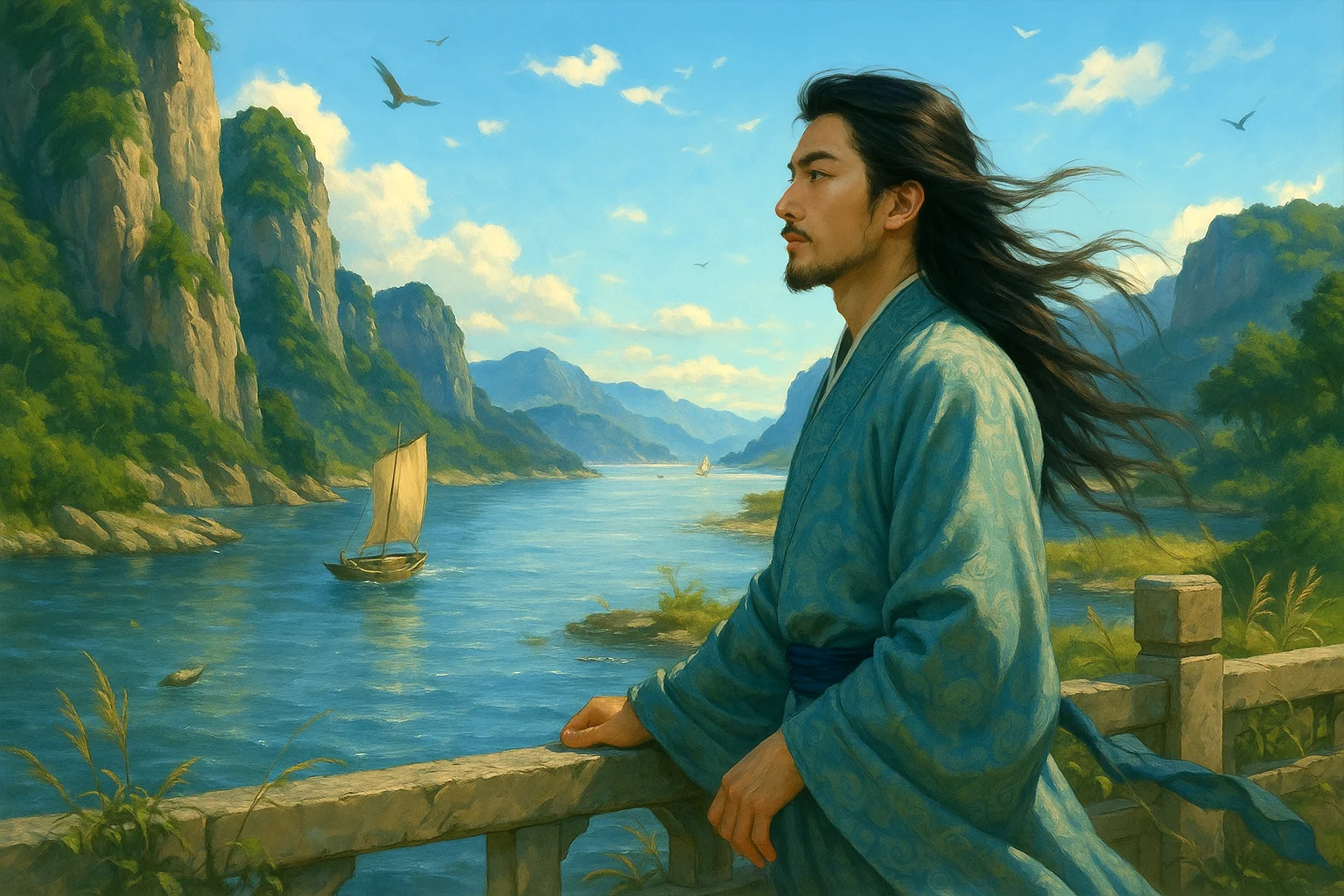
Su Shi (苏轼, 1037 - 1101), a native of Meishan in Sichuan, was a polymath of the Northern Song literary world. His prose was expansive and unrestrained, his poetry fresh and vigorous, and his ci poetry pioneered the bold and unconstrained style. In calligraphy, he created the "Su Style," and in painting, he championed "spiritual resonance," earning him a place among the "Four Masters of the Song." Despite repeated political persecutions—most notably the "Poetry Case of the Black Terrace"—his exile to Huangzhou, Huizhou, and Danzhou yielded timeless masterpieces. Lu You praised him as "the literary patriarch of an era."








